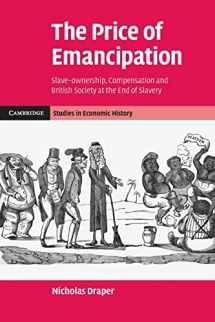
The Price of Emancipation: Slave-Ownership, Compensation and British Society at the End of Slavery (Cambridge Studies in Economic History - Second Series)
Book details
Summary
Description
When colonial slavery was abolished in 1833 the British government paid £20 million to slave-owners as compensation: the enslaved received nothing. Drawing on the records of the Commissioners of Slave Compensation, which represent a complete census of slave-ownership, this book provides a comprehensive analysis of the extent and importance of absentee slave-ownership and its impact on British society. Moving away from the historiographical tradition of isolated case studies, it reveals the extent of slave-ownership among metropolitan elites, and identifies concentrations of both rentier and mercantile slave-holders, tracing their influence in local and national politics, in business and in institutions such as the Church. In analysing this permeation of British society by slave-owners and their success in securing compensation from the state, the book challenges conventional narratives of abolitionist Britain and provides a fresh perspective of British society and politics on the eve of the Victorian era.


We would LOVE it if you could help us and other readers by reviewing the book
Book review



